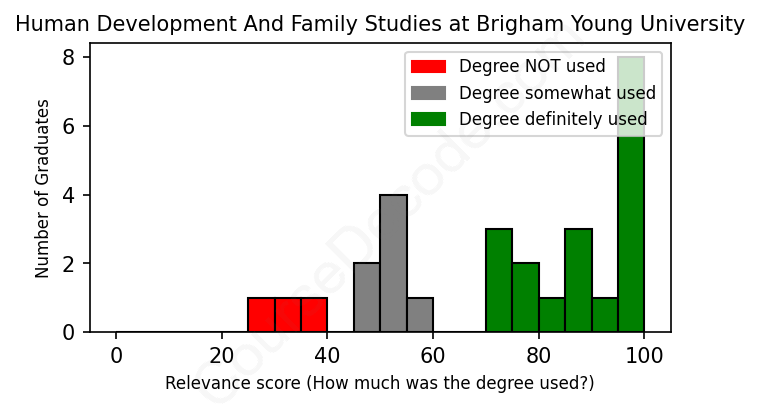
First, some facts. Of the Human Development And Family Studies graduates from Brigham Young University we've analyzed , here's how many have used (or NOT used) their degree in their career:

These are estimates based on AI analysis of 28 LinkedIn profiles (see below).
The verdict? Above average. Overall, with an average relevance score of 73%, Human Development And Family Studies graduates from Brigham Young University have a higher likelihood (+6%) of finding work in this field compared to the average graduate across all fields:
And for comparison, here's the chart for all profiles we've looked at across all degrees.
Also, after graduating, 39% of these graduates have pursued further education other than another Bachelor's degree (such as a Masters degree or other), compared to the average across all profiles of 35%. This suggests you may need more than just a Bachelors degree to be competitive as a Human Development And Family Studies graduate.
See the details:
|
Relevance score: 45% We think this person has gone into a career only somewhat relevant to their degree. We think this person has gone into a career only somewhat relevant to their degree.
DEGREE INFOGraduated in 2018 from Brigham Young University with a Bachelor's degree in Human Development And Family Studies. Also pursued further education since (see below). JOB HISTORY SINCE GRADUATIONOperations Intern Make-A-Wish Utah Jan 2019 - Apr 2019 Experience Director  Grantwell Apr 2019 - Apr 2020 Student Affairs Intern  Brigham Young University Jun 2019 - Aug 2019 MPA Student Mentor  Brigham Young University Apr 2019 - Apr 2020 Marriage and Family Therapy Accreditation Coordinator  Brigham Young University Jan 2021 - Feb 2022 New Student Orientation Coordinator  Utah Valley University Feb 2021 - Feb 2022 Graduate Admissions Coordinator  Utah Valley University Feb 2022 - Present FURTHER DEGREES DONE SINCE GRADUATINGMaster of Public Administration - MPABrigham Young University Marriott School of Business 2018 - 2020 ABOUTA Master of Public Administration graduate with skills in communication, Excel, statistical analysis, human and student development, research, leadership and organization. I value fostering positive environments for student development and leadership and strive to make a positive impact in my communities. |
The top 10 most common jobs done by the graduates we've analyzed (ranked most common to least) are:
After looking through the LinkedIn profiles of people who studied Human Development and Family Studies at Brigham Young University, it's clear that many of them have taken on roles that are closely tied to their degree. The most common types of jobs include positions like instructors, family advocates, and various roles in counseling and therapy settings. For instance, many graduates have become therapists or counselors, which obviously makes perfect sense since these jobs directly apply the principles of human development, family dynamics, and psychology that they learned in school. Other notable roles include research associates and program coordinators where understanding family systems and human behavior is essential for effectively serving communities.
However, not all positions are directly relevant to Human Development and Family Studies. Some graduates have moved into areas like project management, compliance, or administrative roles that don't fully utilize their specialized training. For example, roles like marketing director or various administrative positions tend to focus more on other skills, even if a little understanding of human behavior might help. Overall, while many graduates are successfully implementing their knowledge in relevant fields, there are still a fair number engaging in jobs that don’t deeply connect with their academic background. It goes to show that while a degree in Human Development and Family Studies can open many doors, the journey can lead to a variety of paths, some of which may stray from the original focus of the coursework.
Here is a visual representation of the most common words in job titles for Human Development And Family Studies graduates (this is across all Human Development And Family Studies graduates we've analyzed, not just those who went to Brigham Young University):

Looking at the career trajectories of graduates from the Human Development and Family Studies program at Brigham Young University, it's clear that many of them have carved out careers that are fairly relevant to their field of study. Right after graduation, a lot of them jump into internships or entry-level positions related to mental health, community services, or education, like research associates, therapists, and program coordinators. It's awesome to see how many start with roles that directly tie back to human development themes, suggesting that this degree really has practical applications.
Five to ten years down the line, many of these graduates tend to advance into more specialized or leadership roles, such as program directors, managers, and educators. However, it’s interesting to note that there are also several examples of graduates branching into different sectors, including marketing or business management, which might not directly connect to family studies. Overall, while many are successfully sticking to careers that relate to human development, some are exploring diverse paths that might seem a bit off the beaten track. But this diversity showcases the versatile nature of the skills gained through their education, allowing them to adapt in the job market. All in all, while there are some who have transitioned to unrelated fields, a significant number have built meaningful careers in areas that support families and communities, reflecting positively on their academic foundation.
The Bachelor’s degree in Human Development and Family Studies at Brigham Young University is generally considered to be on the easier side compared to some of the more intense STEM majors or super competitive programs. It combines psychology, sociology, and a bit of family dynamics, so if you enjoy those topics and have a knack for understanding people, you'll probably find it pretty manageable. There’s a fair amount of reading and writing, and some projects or group work, but if you stay organized and keep up with your assignments, it’s doable. Overall, it's seen as a solid choice for those who are more interested in the subject matter and want a slightly less stressful academic experience.
Most commonly, in the LinkedIn profiles we've looked at, it takes people 5 years to finish a Bachelor degree in Human Development And Family Studies.
So, looking at the job paths of these graduates from Brigham Young University in Human Development and Family Studies, it seems like they've had a pretty mixed bag when it comes to making decent money. A lot of them started out with internships and low-level positions, which is common for fresh grads, but it seems like some have climbed the ladder a bit—like the folks who went from being grant writers to senior roles or even CFOs. However, many others are still in relatively low-paying roles or part-time jobs, especially those with teaching or non-profit positions, which typically don’t pay as well. Overall, it looks like while a few may be doing well financially, many are still working their way up and might not be making bank just yet.
Here is a visual representation of the most common words seen in the "about" section of LinkedIn profiles who have a Bachelor degree in Human Development And Family Studies (this is across all Human Development And Family Studies graduates we've analyzed, not just those who went to Brigham Young University). This may or may not be useful:

Here are all colleges offering a Bachelor degree in Human Development And Family Studies (ordered by the average relevance score of their Human Development And Family Studies graduates, best to worst) where we have analyzed at least 10 of their graduates:
| College | Score | Count |
|---|---|---|
 Oklahoma State University Oklahoma State University
|
91 | 10 |
 University of Wisconsin-Madison University of Wisconsin-Madison
|
84 | 15 |
 University of Wisconsin-Stout University of Wisconsin-Stout
|
83 | 22 |
 The University of Texas at Austin The University of Texas at Austin
|
81 | 14 |
 Virginia Tech Virginia Tech
|
80 | 12 |
 The Ohio State University The Ohio State University
|
77 | 12 |
 Penn State University Penn State University
|
76 | 34 |
 University of California, Davis University of California, Davis
|
76 | 18 |
 Kansas State University Kansas State University
|
75 | 17 |
 University of North Texas University of North Texas
|
74 | 12 |
 University of Illinois at Urbana-Champaign University of Illinois at Urbana-Champaign
|
74 | 12 |
 Brigham Young University Brigham Young University
|
73 | 28 |
 University of Connecticut University of Connecticut
|
72 | 22 |
 Michigan State University Michigan State University
|
71 | 18 |
 Texas Tech University Texas Tech University
|
70 | 26 |
 Colorado State University Colorado State University
|
69 | 41 |
 Bowling Green State University Bowling Green State University
|
69 | 18 |
 University of Rhode Island University of Rhode Island
|
69 | 14 |
 Oregon State University Oregon State University
|
68 | 28 |
 Washington State University Washington State University
|
67 | 16 |
 University of Arizona University of Arizona
|
62 | 13 |
 The University of Alabama The University of Alabama
|
62 | 10 |
 Arizona State University Arizona State University
|
61 | 29 |
 The University of Georgia The University of Georgia
|
61 | 17 |
 University of North Carolina at Greensboro University of North Carolina at Greensboro
|
58 | 14 |
 California State University San Marcos California State University San Marcos
|
49 | 12 |